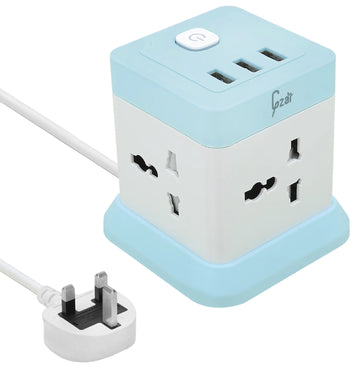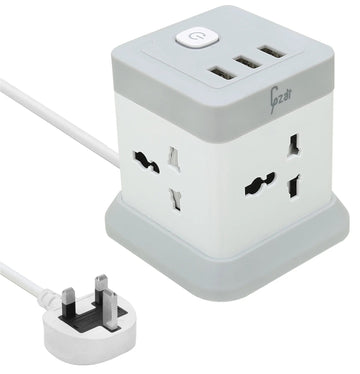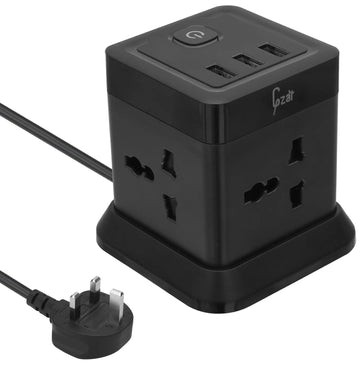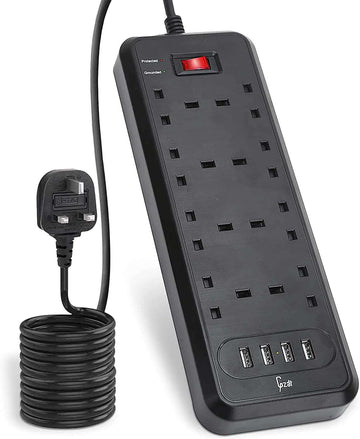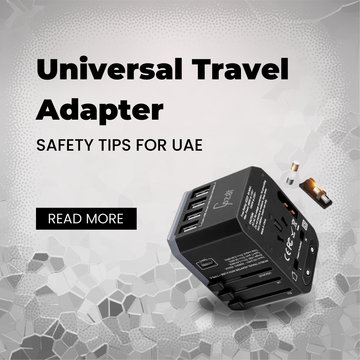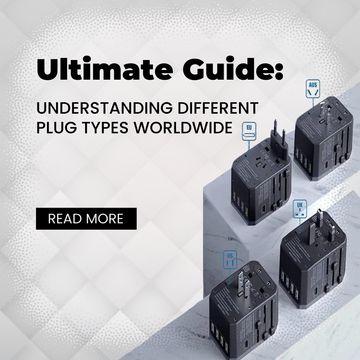Introduction
As travel becomes increasingly integral to our lives, the necessity to keep electronic devices powered across international borders has become paramount. For UAE residents venturing abroad, understanding voltage compatibility is not just about convenience but also about ensuring the safety and longevity of your electronic equipment. In this guide, we'll delve into the nuances of global voltage standards and provide insights into safely using travel adapters and converters.
Understanding Voltage Compatibility
Voltage compatibility is critical for the safe operation of electronic devices worldwide. Incorrect voltage application can lead to device failure or even catastrophic damage.
Global Voltage Standards
Different regions of the world operate on varying voltage and frequency standards. As an electronics engineer, it's vital to understand these specifications to prevent potential harm to your devices.
- UAE Standard: The standard voltage in the UAE is 230V at 50Hz. Devices designed for this standard must be carefully checked when used elsewhere.
- North America: Utilizes a lower standard of 110-120V at 60Hz, necessitating step-up conversion for many UAE appliances.
- Europe: Similar to the UAE, most European countries use 220-240V at 50Hz, reducing compatibility issues but requiring plug adaptation.
- Asia: Voltage standards vary widely; for example, Japan uses 100V, while China and India predominantly use 220-240V.
Understanding these differences is crucial to prevent overvoltage or undervoltage scenarios, both of which can cause device malfunction or damage.

Dual-Voltage vs. Single-Voltage Devices
The distinction between dual-voltage and single-voltage devices is fundamental for determining the need for additional voltage conversion equipment.
-
Dual-Voltage Devices: These are engineered to function at both 110-120V and 220-240V. Such devices include integrated circuits that automatically adjust to input voltage variations.
- Identification: Check for labels such as "110-240V" on your device or its power supply unit.
- Single-Voltage Devices: Designed for a specific voltage range. These devices require a voltage converter if used outside their intended range to avoid damage or inefficient operation.
Shop dual-voltage travel devices
Identifying Voltage Requirements
Properly identifying the voltage requirements of your devices is essential for their safe operation abroad.
- Device Labels: Most electronics will have a label near the power input indicating voltage requirements. This label is often near the serial number or on the power adapter itself.
- Power Adapter Specifications: Check your adapter's specifications for voltage range and amperage to ensure compatibility with the destination country's power supply.
Types of Voltage Converters
Voltage converters are critical tools for transforming electrical energy from one form to another, accommodating devices with different voltage requirements.
Step-Up and Step-Down Converters
Converters are designed to either increase or decrease the input voltage to match the requirements of the connected device.
- Step-Up Converters: These devices increase the voltage from 110V to 220V. They are essential for operating UAE appliances in North American environments.
- Step-Down Converters: Used to reduce voltage from 220V to 110V, suitable for operating North American devices in regions with higher voltage standards.
When to Use a Voltage Converter
Determining the necessity of a voltage converter depends on both the destination's power supply and the device's voltage requirements.
- High-Power Appliances: Devices such as hair dryers, electric kettles, and irons generally require a converter due to their high power consumption and specific voltage needs.
- Single-Voltage Electronics: For devices not designed to handle dual-voltage input, a converter is required to match the local voltage supply.
Buy the best voltage converters
Selecting the Right Converter
Choosing the correct converter involves considering several critical factors:
- Wattage Capacity: Ensure that the converter can handle the wattage of your device. Exceeding this capacity can result in overheating or failure.
- Portability: For travelers, a lightweight and compact converter is preferable, balancing functionality and ease of transport.
Safety Tips for Using Voltage Converters and Adapters
Ensuring the safe use of voltage converters and adapters is crucial to prevent electrical hazards and maintain device integrity.
Avoiding Overloading
Overloading a converter can lead to overheating, damage, and potential safety hazards.
- Wattage Limits: Each converter has a maximum wattage rating that should never be exceeded. Verify your device's power requirements to avoid exceeding these limits.
- One Device at a Time: It is recommended to connect only one high-power device per converter to prevent overloading.
Regular Equipment Inspection
Regular inspections of your converters and adapters can preemptively identify potential issues.
- Check for Damage: Before each use, inspect the equipment for signs of wear, such as frayed wires, burn marks, or loose connections.
- Immediate Replacement: Replace any equipment showing signs of damage to avoid electrical hazards or device failure.
Use of Surge Protectors
Surge protectors are vital for safeguarding electronic devices against unexpected voltage spikes.
- Voltage Spikes: Devices such as laptops and smartphones can be particularly sensitive to voltage fluctuations. Surge protectors help mitigate these risks.
- Built-In Protection: Opt for adapters with integrated surge protection to enhance safety and protect your devices from electrical anomalies.
Handling High-Power Devices
Proper management of high-power devices is essential to ensure safe operation while traveling.
- Manufacturer Guidelines: Always follow the manufacturer's instructions for using high-power devices in international settings. This often includes specific guidelines for voltage conversion.
- Travel Alternatives: Consider investing in dual-voltage travel versions of high-power appliances to simplify the conversion process.
Purchase travel-friendly devices
Advanced Tips for Tech-Savvy Travelers
Leveraging advanced technology can optimize power usage and enhance safety for tech-savvy travelers.
Smart Adapters
Smart adapters offer features that enhance both functionality and convenience for modern travelers.
- Features: Look for smart adapters equipped with USB ports, surge protection, and Wi-Fi connectivity to charge multiple devices simultaneously.
- Compatibility: Ensure that your smart adapter supports the plug types and voltage standards of your destination.
Backup Power Solutions
Backup power solutions ensure your devices remain powered even in the absence of direct electrical outlets.
- Portable Power Banks: These devices are invaluable for keeping your electronics charged when access to outlets is limited.
- Solar-Powered Chargers: For outdoor enthusiasts, solar-powered chargers provide a sustainable solution for charging devices during travel.
Using Technology to Monitor Power Usage
Utilizing technology to monitor and manage power usage can prevent overconsumption and extend device lifespan.
- Power Management Apps: Apps that track your device's power consumption and suggest optimizations can help manage energy use efficiently.
- Smart Charging: Devices with smart charging capabilities adapt to the device's power needs, optimizing energy consumption and preventing overcharging.
Common Mistakes and How to Avoid Them
Awareness of common errors and strategies to avoid them is crucial for maintaining device safety and functionality.
Misconceptions About Voltage Compatibility
Misunderstandings about voltage compatibility can lead to device damage or inefficiencies.
- Assuming All Devices Are Dual-Voltage: It's essential to verify your device's voltage compatibility to prevent potential damage.
- Overlooking Converter Wattage: Ensure that the wattage capacity of your converter matches the device's requirements to prevent overloading and potential damage.
Learn about device compatibility
Incorrect Use of Adapters and Converters
Proper usage of adapters and converters is critical for maintaining safe and efficient operation.
- Forgetting Plug Adapters: Understand that converters and adapters serve distinct functions and may both be necessary when traveling.
- Improper Connection: Ensure that all connections are secure to prevent accidents and ensure seamless operation.
Product Recommendations and Buying Guide
Selecting the appropriate travel adapters and converters is key to ensuring safety and efficiency when traveling.
Key Features to Consider
When choosing a product, prioritize the following features:
- Wattage Capacity: Ensure that the device's power requirements align with the converter's capacity.
- Portability: Opt for products that balance functionality with ease of transport.
- Built-In Protection: Devices with integrated surge protection and smart charging capabilities offer enhanced safety.
Recommended Products
Here are some top recommendations for travel adapters and converters:
- GZAR Universal Travel Adapter: Offers comprehensive compatibility with multiple plug types and includes USB ports for charging multiple devices simultaneously.
- Voltage Converter Pro: A compact, efficient solution for converting voltages with built-in surge protection to ensure device safety.
Frequently Asked Questions
-
What is the difference between a travel adapter and a voltage converter?
- A travel adapter allows your device to fit into a foreign outlet but doesn't change the voltage. A voltage converter changes the electrical voltage to match your device's requirements.
-
Do I need a voltage converter for my smartphone?
- Most smartphones are dual-voltage and only require a travel adapter. Check your phone's charger label for "100-240V" to confirm.
-
How can I identify if my device is dual-voltage?
- Look for a label on your device or charger that states "110-240V." This indicates it can operate on both voltage ranges.
-
Can I use a hair dryer with a travel adapter?
- If your hair dryer is dual-voltage, you can use it with a travel adapter. Otherwise, you will need a voltage converter to avoid damage.
-
What should I do if my device doesn't match the local voltage?
- Use a voltage converter to match your device's voltage requirements to the local supply or consider purchasing a dual-voltage device.
-
Why is voltage compatibility important?
- Using the wrong voltage can damage your devices or cause safety hazards. Always ensure voltage compatibility before use.
-
Where can I buy travel adapters in the UAE?
- Travel adapters are available at electronics stores, airports, and online retailers like GZAR's online store.
-
Is it safe to use a power strip with a travel adapter?
- Yes, but ensure the power strip is rated for the local voltage and doesn't exceed the adapter's capacity.
-
How many travel adapters should I bring for a trip?
- Consider bringing at least two adapters to accommodate multiple devices and a power strip for additional convenience.
-
Are universal adapters reliable for all regions?
- Universal adapters cover most plug types but verify their compatibility with the specific regions you are visiting.
-
Can I charge multiple devices with one adapter?
- Yes, many adapters have multiple USB ports, allowing you to charge several devices simultaneously.
-
What are the signs of an overloaded adapter?
- Overheating, unusual smells, or device malfunction can indicate an overloaded adapter. Reduce the load or use a higher-capacity adapter.
-
How can I protect my devices from voltage spikes?
- Use adapters with built-in surge protection or a separate surge protector to safeguard your devices.
-
Can I use a travel adapter for my laptop?
- Most laptops are dual-voltage and can be used with a travel adapter. Check the power supply label for confirmation.
-
What if my device gets damaged by incorrect voltage?
- Discontinue use immediately and seek professional repair. Prevent future damage by ensuring voltage compatibility.
-
Do I need different adapters for different countries?
- A universal travel adapter is versatile for multiple regions, but some countries have unique plug types requiring specific adapters.
-
Is a solar charger a good travel accessory?
- Yes, solar chargers provide a sustainable backup power source, especially useful in remote areas without reliable power.
-
What are smart adapters, and how do they work?
- Smart adapters include features like USB ports, surge protection, and sometimes Wi-Fi connectivity for enhanced convenience.
-
How do I use a step-up or step-down converter?
- Connect your device to the converter, ensuring it matches the voltage direction (step-up or step-down) needed for your device's requirements.
-
Why do some devices need a converter while others do not?
- Dual-voltage devices can handle multiple voltage standards, whereas single-voltage devices require conversion to prevent damage.
Conclusion
Ensuring voltage compatibility and adhering to safety tips are crucial for a trouble-free travel experience. By choosing the appropriate adapters and converters, UAE travelers can protect their devices and maintain connectivity on their journeys. Understanding global voltage standards and utilizing the appropriate tools and techniques will ensure that your electronic devices are safely and effectively powered, regardless of your destination.
Final Words
For today's travelers, maintaining power and connectivity is essential. With the right preparation and equipment, you can ensure a successful and stress-free journey. Investing in high-quality travel adapters and voltage converters tailored to your specific needs will enhance your travel experience and ensure that your devices are always ready for use.
Further Reading and Resources
Explore additional resources and guides to deepen your understanding and ensure safe and efficient use of travel adapters and voltage converters:

